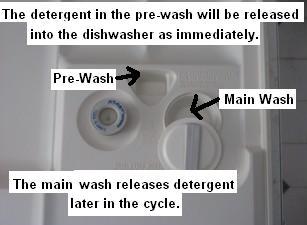Tips To Increase Dishwasher Performance
These dishwasher tips will help increase dishwasher performance. So before you
try to repair your dishwasher or call for service you may consider some of these
simple things that can cause common dishwasher problems. Simple things like
water temperature, water hardness and soil level of dishes can cause problems
with your dishwasher. You may think it is broken and in need of repair when
really it may not. Below are a few things that can hamper dishwasher
performance.
Choosing the right dishwasher detergent
First off you must use dishwasher detergent only. One drop of any other kind
of detergent and the dishwasher will over suds and leak.
I recommend using liquid or powder dishwasher detergent only. The 3-in-one
action pacts are ok but I have found that they sometimes cause dishwashers
over-suds and leak. Note that I use to see this problem a lot more often, maybe
dishwasher detergent companies have recognized the problem and adjusted but I
still don’t recommend them. Furthermore, there have been reports of some type
dishwashers having problems dissolving this type of detergent. Also note that
you may not experience the oversudsing problem if you don’t have soft water.
Dishwasher Detergent Amount
Water hardness and the soil level of your dishes are the two factors in
determining detergent amount. Exact precision of dishwasher detergent is not
necessary, but it important to know what will happen if you use too much
detergent or too little. If you use too much detergent over time your glasses
will suffer. Permanent cloudiness can occur if too much detergent is used. If
too little detergent is used your dishes may not get washed.
There are
two detergent dispensers on most dishwashers; pre-wash and main wash. As I
mentioned before precision on detergent is not necessary so I will roughly
explain how much detergent you should use in this chart. In this chart I will
use three water hardness levels: soft, medium and hard. Water hardness is
measured in grains with 0-3 grains being soft, 3-7 grains being medium and 7-12
being hard. I am going to just use two soil levels; normal soiled and lightly
soiled. The amount of detergent is displayed as Full half or none for the main
wash and pre-wash.
main-wash/pre-wash | main-wash/pre-wash | main-wash/pre-wash |
|
| Lightly Soiled | Half/none | Full/None | Full/None |
| normal Soiled | Half/Half | Full/Half | Full/Full |
To determine the hardness of your water you can call your local water provider if you are on city or county water. Also you can use water hardness test strips, part number WX5X370.

Water Temperature
The water temperature directly effects dishwasher performance. Your water should be at least 130 degrees but no higher than 150 degrees. Your owners’ manual probably says it should be 120 degrees but I believe 130 or higher is much better. If your water isn’t at least 130 degrees you will have to either turn your water heater up or use the added heat and/or the hot start options available on most dishwashers. Also note that it is very helpful if you turn on the hot water at your sink just before using the dishwasher. In some houses the hot water takes a while to reach the kitchen so it is likely that the water will not even heat up before the dishwasher fills. But if you run the hot water first the water will be good and hot when the dishwasher starts.
Rinse Agent
A rinse agent must be used for optimal dishwasher performance. If you do not use a rinse agent the dishes will be left with spots and the heated dry cycle will not be as effective. Most dishwashers today have rinse agent dispensers so be sure to keep them full.
Pre Scrape and Rinse
It is important to scrape and rinse your dishes to ensure the best dishwasher performance. I am not saying you need to wash the dishes before you load the dishwasher just that it is very important there isn’t large chunks of food on the dishes when placed in the dishwasher. This is more important with newer dishwashers because newer dishwashers use a low volume water wash. What this means is the holes in the wash arms are a lot smaller than they use to be, therefore it doesn’t take much to clog them up. What is even worse is the fact that it is near impossible to clean some of these wash arms out due to the size of the holes. You will most likely have to replace the wash arms if they become clogged. So the large chunks of food have got to go. Furthermore, the dishwasher may not get the dishes completely clean if it has to work extra hard removing the large chunks of food off the dishes.
Return From Tips To Increase Dishwasher Performance